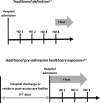Respiratory syncytial virus: an under-recognized healthcare-associated infection
- PMID: 40376828
- PMCID: PMC12169951
- DOI: 10.1017/ice.2025.88
Respiratory syncytial virus: an under-recognized healthcare-associated infection
Abstract
Objective: Prior reports of healthcare-associated respiratory syncytial virus (RSV) have been limited to cases diagnosed after the third day of hospitalization. The omission of other healthcare settings where RSV transmission may occur underestimates the true incidence of healthcare-associated RSV.
Design: Retrospective cross-sectional study.
Setting: United States RSV Hospitalization Surveillance Network (RSV-NET) during 2016-2017 through 2018-2019 seasons.
Patients: Laboratory-confirmed RSV-related hospitalizations in an eight-county catchment area in Tennessee.
Methods: Surveillance data from RSV-NET were used to evaluate the population-level burden of healthcare-associated RSV. The incidence of healthcare-associated RSV was determined using the traditional definition (i.e., positive RSV test after hospital day 3) in addition to often under-recognized cases associated with recent post-acute care facility admission or a recent acute care hospitalization for a non-RSV illness in the preceding 7 days.
Results: Among the 900 laboratory-confirmed RSV-related hospitalizations, 41 (4.6%) had traditionally defined healthcare-associated RSV. Including patients with a positive RSV test obtained in the first 3 days of hospitalization and who were either transferred to the hospital directly from a post-acute care facility or who were recently discharged from an acute care facility for a non-RSV illness in the preceding 7 days identified an additional 95 cases (10.6% of all RSV-related hospitalizations).
Conclusions: RSV is an often under-recognized healthcare-associated infection. Capturing other healthcare exposures that may serve as the initial site of viral transmission may provide more comprehensive estimates of the burden of healthcare-associated RSV and inform improved infection prevention strategies and vaccination efforts.
Conflict of interest statement
EG, YZ, DN, EM, TMM, WS, BH report no conflicts of interest. HKT receives funding from the Centers for Disease Control and Prevention through the Emerging Infections Program. TRT serves on the Board of Directors for OmniSolve.
Figures


References
-
- Kestler M, Muñoz P, Mateos M, Adrados D, Bouza E. Respiratory syncytial virus burden among adults during flu season: an underestimated pathology. J Hosp Infect. 2018;100:463–468. - PubMed
LinkOut - more resources
Full Text Sources

